Leading the hotel industry in Addis Ababa | Intercontinental Addis Hotel
Zenawi Mesfin, General Manager of Intercontinental Addis Hotel
Bringing the US hotel industry experience into Ethiopia, Mr Mesfin left a significant footprint in transforming Intercontinental Addis Hotel into a top quality 5 star hotel, which is currently leading the hotel industry in Addis Ababa.
Interview with Zenawi Mesfin, General Manager of Intercontinental Addis Hotel
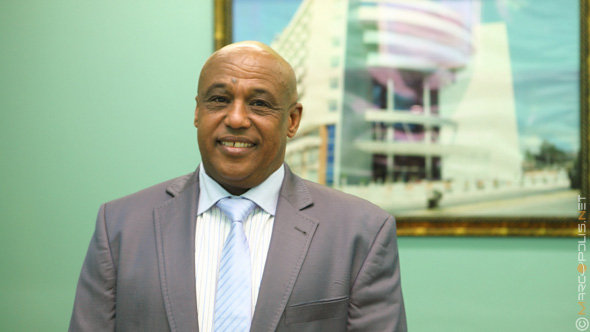
What is your overview of the hospitality sector in Ethiopia and your outlook for 2014 and onward?
The hospitality sector in Ethiopia is in an infant stage and it is growing slowly because as you may be aware, many hotels were not open twenty years ago. Hilton Hotel was the only hotel for a long time in the hospitality industry. When this regime was coming up, a lot of hotels started popping up but the problem was and the problem still is that there are no schools offering a first degree up to a master’s degree or a doctoral degree in the hospitality field. That is a major challenge for the industry right now. We are facing a lot of problems because of human resource issues. That is the major challenge and it is what the government is facing and what the tourism industry is facing right now.
Can you give us a brief history of your hotel since its inception?
This hotel, Intercontinental, is five years old but it was not really managed before as it should be. A few years ago the ownership of the hotel asked me to be the general manager – it was two years ago, starting in 2011. Before at the hotel, there was not any system or any policies or standard manuals. I brought my skills and my knowledge from working in the United States as a general manager, a director of operations and before that also an assistant GM.
So I brought back my skill and knowledge and what I did is that I primarily concentrated on four things. The first thing was to establish a system starting from the policy making, especially as the hotel did not have any policies. I started to create the standard manuals so that things could operate very well. After I set up the system, I also created a Property Implement Plan (PIP). The furniture fixture equipment is currently at a standard of 5 star hotels―I tried to find, bring and thus improve the equipment configuration in the furniture fixture configuration. The product should fit with a 5 star standard.
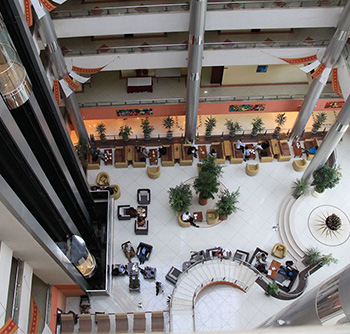
The third thing I did was related to human resource development. I tried to plan for the training standard. Every department has a standard manual and we just started training with the standard manuals. Every department should provide training for every employee every day, every week, every month and every season. So what I did is, I started from the personnel cleaning service. As I always say there are two kinds of service: there is a convivial and a procedural service, or there is a dead service and a live service. So I tried to put in the live service which is starting from every department, they have their own training standard. So I improved that and then with this kind of management technique, the hotel is achieving from $3 to $10. This shows the hotel is doing great right now.
Can you talk to us in more detail about your property and some of the amenities you have here?
The Intercontinental Hotel is a 5 star hotel. There are many amenities including three meeting rooms, restaurants, a spa which includes a jacuzzi, a steam room and sauna, a swimming pool on the top floor, a gym and a very nice kitchen. There are two restaurant concepts: one is American-style and the other is national dishes. We like to offer our customers a diverse assortment of products. We also built an 18 floor extension building in the back. Parking is always a challenge but we have a parking lot that can hold about 200 to 250 cars. The first floor of the new building is a fountain floor and there is a revolving restaurant on the top. It is a unique building not only thanks to the revolving restaurant, but there is an apartment hotel as well. There are almost 60 rooms and there is a meeting hall that can accommodate 1,500 to 2,000 people. There are also different kinds of business centers there.
We had a review and in terms of service we are number one. They rated Intercontinental as the best. There are also travel reviews and we get a lot of feedback. I love feedback and I love complaints because that is how we try to reach the maximum limit of guest satisfaction.
What kinds of travelers visit Intercontinental Addis Hotel?
Our primary marketing target is international organizations such as the UN, UNDP, UNICEF, ECA, European Union, and African Union. This also helps us as there are different people in the delegations coming from different countries.
The second type of clients is government officials, including those in delegations. They choose the Intercontinental Hotel because of our security, services and amenities.
The third type is tour operators, also part of embassies and special people who are connected with different kind of embassies in the country in particular. So we have a very good relationship. We do some ambassador nights, media nights and different kinds of activities. We try to capture their attention and that’s why we have this kind of marketing. There are also corporate clients and people who are coming to invest in Ethiopia. We also attract these people and try to connect them. We have a diverse assortment of clients.
What type of marketing tools are you pursuing to gain more market share?
I always say that we can’t wait for people to come. We have to knock on their door. So we have a marketing department and these marketing associates have their area of concentration. They visit every department, every business client, international organizations, embassies, tour operators, government officials, and companies. They are well-connected and we try to use this type of sell-out strategy. The second tool is that we also invite different kinds of people here to have lunch, dinner or get connected. This is a personal selling system and we use this kind of marketing technique.
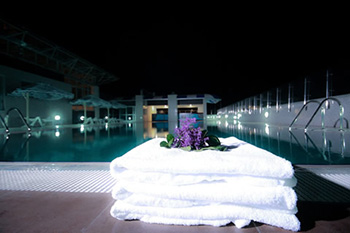
Do you have any plans for expansion, either here in Ethiopia or in the neighboring countries?
Yes, we have a plan for this. First, the expansion behind our main building is a great asset for us. Then we are planning to expand to some other cities, maybe like Bahir Dar and probably in Awasa (Hawassa). At this time, we are also exploring countries in Africa to determine which one has the best investment climate that we can afford. We are trying to study and assess which country is the best for our investment.
How has your occupancy been and what type of reviews have you been receiving recently?
Our occupancy is now between 70 and 80% this year which is very great. The previous year, since I have been here since 2011, our occupancy has been growing. As I was saying, we are using good marketing techniques now.
There is a courtesy call that we do; five minutes after you check into the hotel you get a courtesy call asking how you find the room and asking if we can help with anything. That’s the guest relations officer’s work. We always do these kinds of activities on a daily basis.As well, our service is different from other hotels. What is different is that we have training in human development; we train every employee. We start from the greeting up to all levels. There is a live waiter and there is a dead waiter. There is a live receptionist and there is a dead receptionist. We identify them. There is also a dead engineer and a live engineer. If a guest only asks for a lamp, that’s a dead engineer.
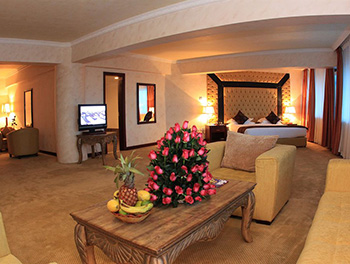
You are conveniently located in the heart of Addis Ababa. You can actually walk to the United Nations where they hold conferences and a lot of meetings. What more are you doing to target the United Nations to become the hotel of choice?
When we do this ourselves and demand a very high level, our customers recognize this level of service and that’s why we our number one in services in the tourism industry. We had a review and in terms of service we are number one. They rated Intercontinental as the best. There are also travel reviews and we get a lot of feedback. Most of them are positive but there are some negative and we are always learning from that. We like to have the feedback because without feedback we can’t improve.
I love feedback and I love complaints because that is how we try to reach the maximum limit of guest satisfaction.
That is a good question. As you said, we have a good location but the location doesn’t work by itself. We have to work on it. Our marketing team has great personal selling skills. What they did was they tried to invite various people. We also have different kinds of nightly activities such as ambassador night, UN night, UNDP night or sometimes we have a party here to give them a free evening to well connect them with us. We prefer this kind of marketing style. We also make very good personal connections through many director generals and others who are in charge of various departments.
What challenges do you see facing the hospitality sector in Ethiopia?
We also identify which company brings the most business to us and we deliver flower gifts or homemade cakes to them when they have national days. Every country or department has some kind of holidays. We just remind them and we give them a gift of flowers or different kinds of gifts. That way we have a good personal connection. Then if we have a slow business time, we call them and ask them what is happening with them. Because of that, they know our service and our products so they can easily give us business.
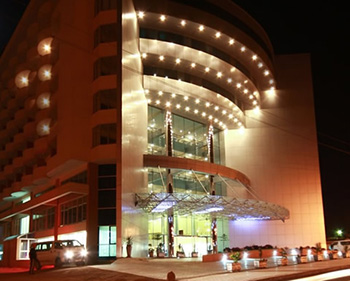
The major challenge is in making foreign purchases. As I said, the infrastructure of hotels has popped up within just five or six years. Before that, there were no hotels and no training schools. When you open a business you also need the supporting businesses. For example, if you need to make some kind of foreign purchase, such as fish or very good shrimp―if I want to get such items, it’s a huge challenge; I have to wait for a couple of days. With this kind of logistics, it creates a logistical problem. In Addis, you can’t find any items related to hotels. You may find some but they are of a lower standard. This is a problem that we are facing as a hotel industry.
Another challenge is human resources and the training of people. If you go to Europe, almost 40% of GDP is coming from the tourism sector. There the hotels are very careful because the government is also concentrated on hotels because the tourism sector is dependent on hotel service. Here, the government has to start paying attention, first of all to open a school. There is no hotel or hospitality school, or they are very rare and of lower standard.
There should also be a framework for a logistical department everywhere. For example if I need any furniture fixture or if I need flatware or glassware, where do I get it? I have to go to Dubai or China or the U.S. So in order to get this, it depends on the quick response we can get. If something breaks today or we need spare parts, it is very challenging because we need to import these from outside Ethiopia.
The third challenge is the perception of the people and the perception of the government. This needs to change too. The hotel industry is a part of the growing economy and the GDP. The government should be paying close attention to developing this kind of private sector. It is an extremely important sector. If you saw the GDP in Ethiopia, you may start laughing. Tourism represents 1.6% of GDP, which is very ridiculous. There are almost 100,000 tourists a year coming into the country or maybe 60,000 or 80,000, I don’t know the exact figures. If your tourism sector represents 20% of GDP, you don’t need to find mines or gasses. Here the economy is growing because of the tourism. In order to grow the tourism industry, by its nature Ethiopia has a diverse assortment of tourist attractions. 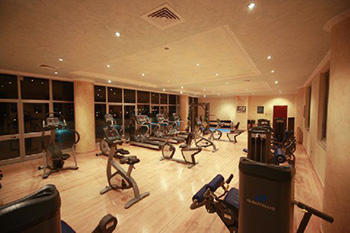 There are a lot of geological, natural and cultural attractions. So the tourism industry should be centered on hotels and the private sector in order to grow the tourism. If that GDP is 1.6% – imagine that. In Europe, the average of tourism industry is 20% to 25% of GDP. If we can increase the GDP in the country that is when we will grow up. You don’t have to find any diamonds or anything. The diamond is the tourism industry, it is the tourism flow. But at this time they have to pay attention to hotels, private sectors, tour operators and all these types of sectors. The government didn’t pay attention to these areas for a long time but if they pay attention, the private sector will have fewer challenges.
There are a lot of geological, natural and cultural attractions. So the tourism industry should be centered on hotels and the private sector in order to grow the tourism. If that GDP is 1.6% – imagine that. In Europe, the average of tourism industry is 20% to 25% of GDP. If we can increase the GDP in the country that is when we will grow up. You don’t have to find any diamonds or anything. The diamond is the tourism industry, it is the tourism flow. But at this time they have to pay attention to hotels, private sectors, tour operators and all these types of sectors. The government didn’t pay attention to these areas for a long time but if they pay attention, the private sector will have fewer challenges.
A lot of hotels are being demanded. For example, the African Union summit is going on but there are no hotels. People are traveling outside the country in order to get accommodation. This is the problem here. The government should be focused on the tourism industry right now―just like it is focused on agriculture or capital markets. Tourism is the most important. If it does not pay attention to this particular sector, it will be a huge loss for the country. That is why I’m trying to send the message that it is very important. Hotels are a part of the tourism industry.
What is your vision for Intercontinental Addis Hotel?
I came to this country for three things. I had a job in the U.S. as an Assistant GM and then after that I became a GM. I could have stayed there. The reason I came here was to send two messages. One is to be an example and role model of how to manage hotels. This hotel was about to fail. I also want to help other hotels. I want to be a role model of how to manage the hotel; how the hotel is managed is very important for the life of the company.
The second reason I returned back to Ethiopia is that there is a perception that 5 star hotels or international hotels should be managed by outsiders. There are a lot of Ethiopian and local experts too. Why can’t these people also have the opportunity to manage? That perception should be changed and that paradigm should be shifted. There are a lot of expert Ethiopians here. They should be nurtured, sent abroad for studies so that they can manage our hotels.
The third one is the diaspora, they can also provide some input. I’m from diaspora and I can provide some input for my country and serve as an example for others. There are a lot of people that can follow me and not only in hotel management but in any business too. My vision is to bring the hotel industry to its maximum level―and not only hotels or the tourism industry. I want the country to reach the maximum level so we can sell Ethiopia abroad, especially for its tourism industry. That is my vision.
FAIR USE POLICY
This material (including media content) may not be published, broadcasted, rewritten, or redistributed. However, linking directly to the page (including the source, i.e. Marcopolis.net) is permitted and encouraged.